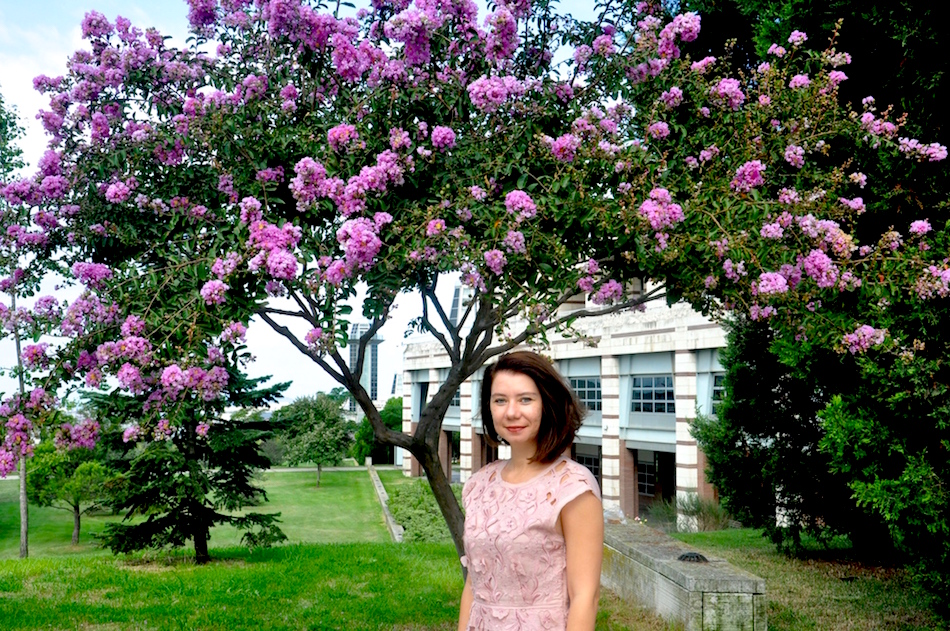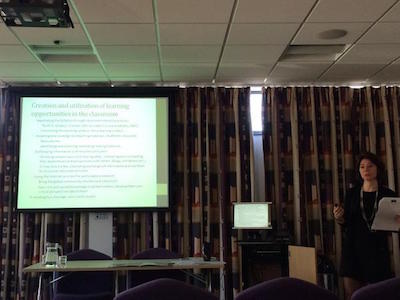
"EAP in a Rapidly Changing Landscape: Issues, Challenges and Solutions"
Review: Tuğçe Gürer
2015 Biennial BALEAP Conference was held in University of Leicester, Leicester on 17th-19th April, 2015. The conference brought together lecturers, researchers, exam providers, and publishers from many different countries. The presentations took place on a number of different platforms: plenaries, talks, workshops, symposia, and poster presentations.

Sabancı University was represented by the workshop titled ‘Promoting Intercultural Awareness and Equality in EAP Courses and Teacher Training’ which was prepared by İlkem Kayıcan and Tuğçe Gürer and delivered by Tuğçe Gürer. This study aims to offer new approaches to EAP teacher training considering the different background needs of students as citizens in a multi-ethnic society and to suggest ways to promote social justice and equality among multiple identities using the concepts of critical pedagogy. At the end of the presentation sharing experiences with the participants led to a productive discussion.
Opening Plenary Talk “Navigation in a complex world: English as compass or map?” by Prof. Rebecca Hughes
Prof. Hughes has joined the British Council Director of International Education after a career working extensively in international Higher Education and English Language and Linguistics. In her talk, she highlighted the rise of phenomenon of English as the world's academic language and English Medium Instruction (EMI) replacing EFL as the main vehicle for furthering English language proficiency. She pointed out the fact that, those who work with international students to help them prepare for studies in the medium of English are working in an increasingly complex, mobile and connected world. Increasing numbers of international institutions are starting to teach in the medium of English; and the teaching of English in primary and secondary schools has strengthened language skills of young people dramatically in key markets for UK institutions. She attracted attention to the fact that by 2024 India, China, Indonesia and the US will be home to over 50 per cent of the world's 18 to 22 year old population with students from very different backgrounds and cultures and India, Indonesia, Brazil, Nigeria and China will dominate global higher education growth in the next decade. She concluded that teachers can provide with 'compass' points to students with diverse language needs as:
•good basic study skills, information capture, processing and synthesis, time management
•language improvement linked to real future academic disciplines and communities
•a sense of confidence, autonomy, our interest in them and other abilities to succeed
•self-reflection and ability to think and question and find their voice
2nd Plenary Talk “Listening and reading in L2 academic contexts: what do we know now, and what can we do about it?” by Dr. Catherine Walter
Dr. Walter is a lecturer in Applied Linguistics at the University of Oxford, having taught English to speakers of other languages, trained language teachers and written award-winning English language textbooks for 25 years before becoming a full-time teacher educator and researcher. In her talk, she raised the question what happens when second language listeners and readers encounter academic texts, she reviewed some research in this area, reflected on what kind of skills are involved and what this means for EAP materials and classroom practice. She used the metaphor 'cello playing' to attract attention to the complexity of reading and listening skills. In order to get better at these skills one needs to practice the different components regularly. She insisted on the fact that teachers should spend more time on helping students learn vocabulary and using dictionaries instead of guessing meaning from context. She also mentioned the importance of teaching pronunciation and using dictogloss and running dictation activities to help learners enhance listening skills.
Closing Plenary Talk “Innovating Instruction: Specificity and English in the disciplines” by Prof. Ken Hyland
Prof. Hyland is currently Director of the Centre for Applied English Studies at The University of Hong Kong where he holds a personal chair in Applied Linguistics and he is currently co-editor of Applied Lingusitics Journal. His primary research interests are written discourse analysis, particularly in academic context. In his talk, he shared his experience at Hong Kong University when they reconsidered English that they taught and redesigned their courses to focus on 'English in the Discipline'. He mentioned that disciplinary variations are at the heart of EAP and involve identifying the particular language features and discourse practices of target groups. He also highlighted research which supports a specific view of teaching to bridge the gap between school-based English and disciplinary studies.
